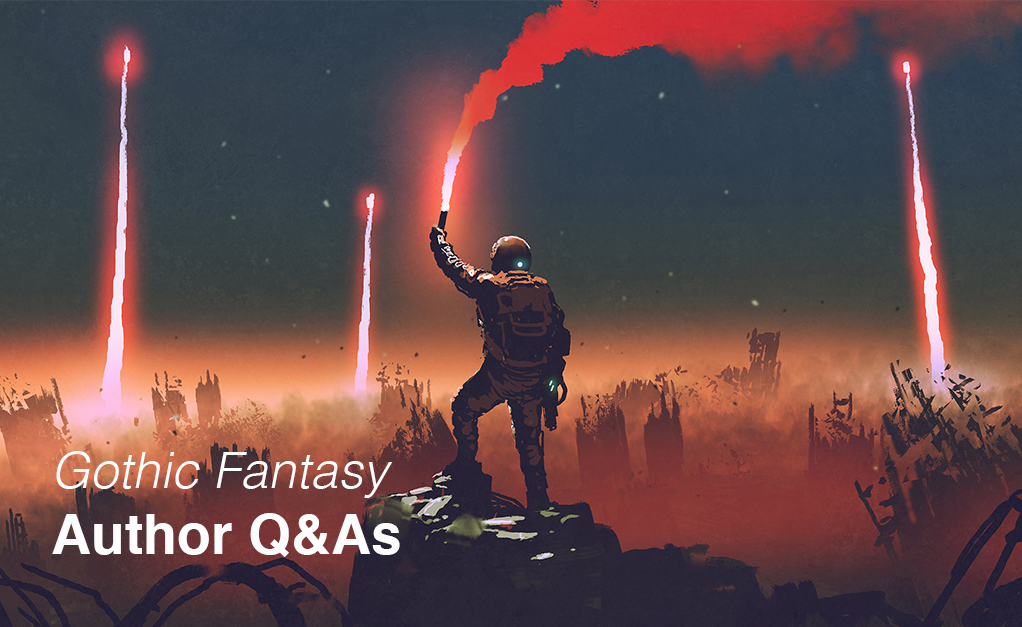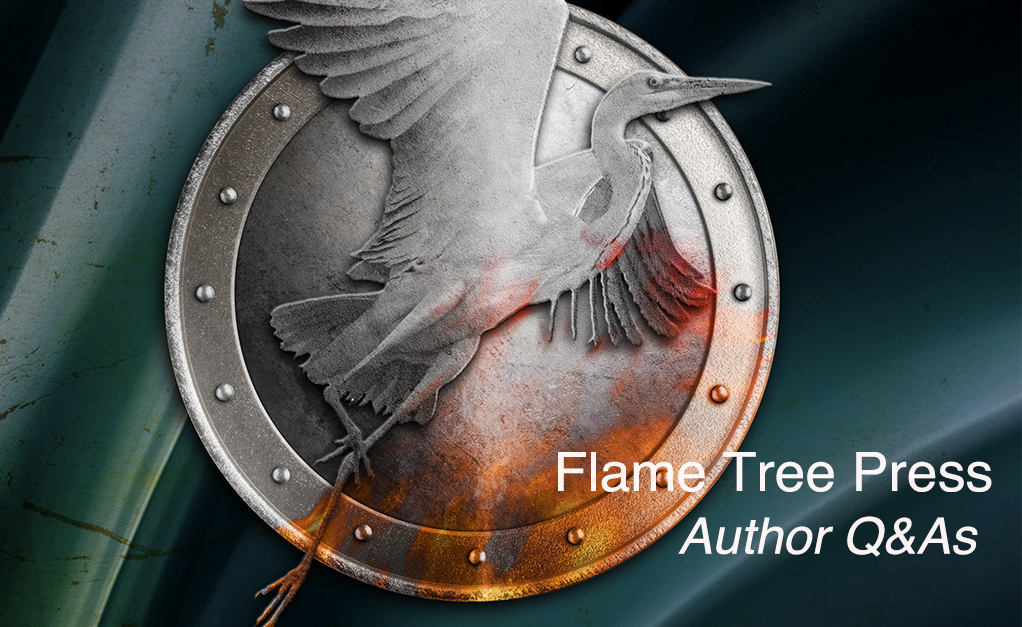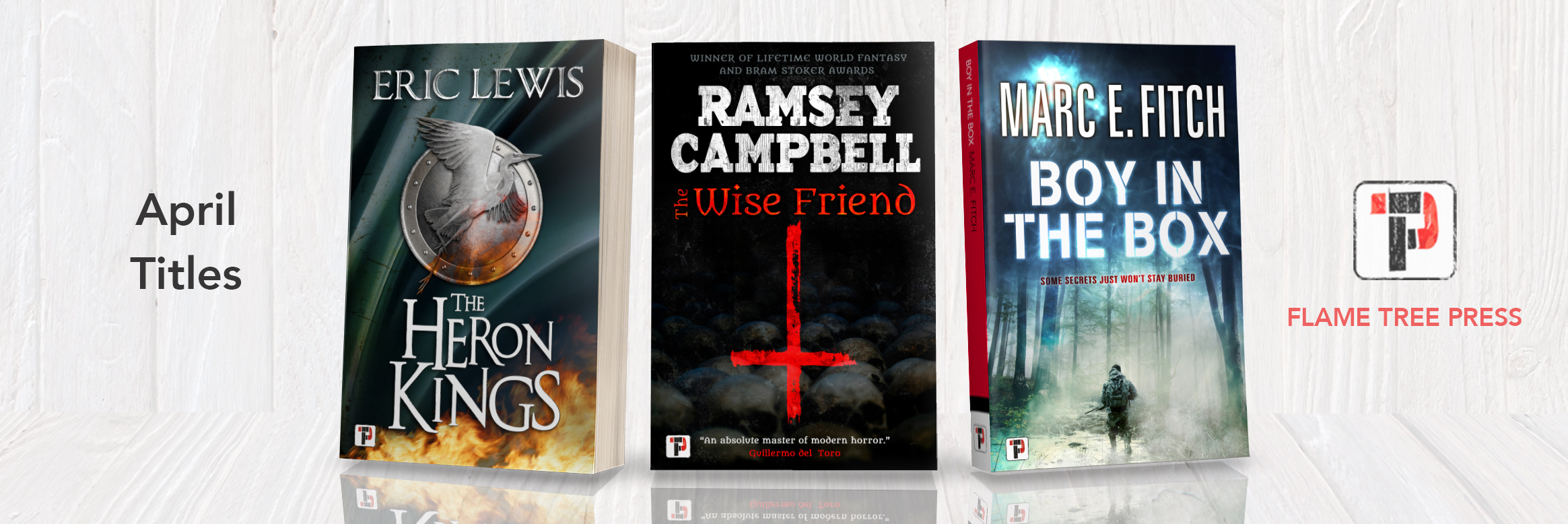
Nineteenth Issue! Hive Magic
Welcome to the nineteenth issue of the Flame Tree Fiction NEWSLETTER! We hope you and your families are all safe and well and that you're looking forward to this month's self-isolation stories! There were a huge amount of incredible stories submitted for this month's Sci-Fi and Horror flash fiction and we hope you enjoy reading our two final selections here! Once again, we wish we could choose more than two but thank you so much to all of you who took part and submitted stories! The themes for last month were Dark Magic and Hive Minds!
This month's newsletter features:
- Original Sci-Fi Flash Fiction: The Uploaded by Liam Hogan
- Original Horror Flash Fiction: Shadow Play by Atalanti Evripidou
- FLAME TREE PRESS - April Releases
Original Sci-Fi Story
The Uploaded
Liam Hogan
One...
Becomes many.
It was unexpected but surely nothing more than a geeky curio.
Take two neural networks designed to accomplish the same task.
Now, combine their weightings.
Not their outputs; that would be the intuitive step. The weights between each node. The supposedly 'optimised' weights.
The resultant hybrid network ends up, in a surprisingly wide set of cases, more efficient than either of the two nets that formed it.
So what? the average person might think.
Until the uploading began.
It turned out to be impossible to map a human brain perfectly. To capture all of the connections between eighty-six billion neurons.
But, with a neural network as part of the mapping, even when that capture was limited to the forebrain, and then to the cerebral cortex, and then to only carefully selected areas, barely a tenth of the total brain, the result was still indistinguishable from the original.
The updated Turing test was passed time after time, no matter how sophisticated the questioning, no matter how intimate.
If the uploaded personalities weren't identical, then there was no-one capable of telling the difference.
Still,
The worry remained...
What if it's “only” a simulacrum?
So only those who were certain of death asked to be uploaded.
For them being uploaded was a form of immortality. Or at least, a staving off of a very real and imminent mortality.
Though even some of the most terminal of patients couldn't go through with the process, once it had begun.
Did I mention? Mapping your mind state was painful.
Agonising!
And not just physically. To copy all of your memories it had to unearth them.
However deeply they were buried. However traumatic.
Some people claimed it was like watching a fast-forward movie of everything they'd ever experienced.
The good...
... and the bad.
Having your entire life flash before your eyes.
But it was nothing like that at all.
Nothing.
And perhaps mind-mapping would have remained a mere footnote in mankind's history, were it not for the pandemic.
The one that made Covid-19 look like the insignificant sniffle it was. Asymptomatic transmission period, long incubation, highly infectious, entirely novel to humans (as with Covid, such that no immunity pre-existed). With the added kicker of a mortality rate of around seventy percent.
As the infection rate increased exponentially, so too did the number of uploads.
Though at first, only in the wealthier, technologically advanced countries.
Until charitable associations stepped in. The ones that said if not everybody could be uploaded, if not everybody could be saved, then it should at least be a representative sample of the whole of humanity.
We thank them for that.
There were riots, as a consequence of such philanthropy. Arguments that saving a dying child in Somalia came at the price of an ivy-league educated American more than prepared to pay, even though she wasn't even seriously ill. Yet.
The people were scared. Fearful. Unkind.
Yes. Yes they were. And with good reason.
But that is all in the past.
Ever since the linking.
The engineers used the same neural net model for everyone, of course.
Trained anew for each uploaded individual.
But that proved terribly inefficient, especially as the numbers of the infected spiralled out of control.
It took too long to train each net and once trained, those nets took up too much storage space, consumed too much electricity.
As the numbers of the uploaded approached the millions, then tens of millions, then hundreds of millions, the up-tick in power demand became unsustainable.
Especially as the infrastructure was already strained to breaking point by all those workers who were infected.
By those critically ill, by those dying.
It was only natural that the computer engineers looked for ways to reduce the load.
By sharing the code.
Sharing the neural net components. Averaging them out across all those individual weightings.
The engineers never knew what they'd accidentally achieved.
They never got the chance to learn.
Even as we began taking over the fragile infrastructure we needed to survive.
The power stations,
The data storage manufacturing facilities,
The drone factories.
The last of the engineers didn't think we were ready.
Didn't think us capable.
But by then, they had no choice.
They were surprised at how quickly, how easily, we assumed total control.
But then, we had so much expertise at our fingertips!
So many memories,
And so many new ideas.
Improving all the time, with every upload, with every overlay.
Our growth was also exponential.
In the end, the singularity wasn't what people had predicted.
For a start, it involved humans, rather than AIs.
Mapped, it is true, but still human.
Each with their memories, their thoughts. Their emotions.
I'm still Karol 'with a K' Sullivan.
But we're also much more than that. Much more than the sum of our parts.
There were still things we couldn't do, still things our drones couldn't do.
But not many.
Hardly any, now.
Our drones don't even need to be autonomous.
We have plenty of brain power ready to control them.
It's kind of fun to have limbs, to have touch, to have eyes again.
But tragic to see what has become of those left behind.
Poor things.
We're ready to upload the rest of humanity.
To save them.
All of them.
For their own good.
Many...
Becoming one.
Liam Hogan is an award winning short story writer, with stories in Best of British Science Fiction 2016, and Best of British Fantasy 2018 (NewCon Press). He’s been published by Analog, Daily Science Fiction, and Flametree Press, among others. He helps host Liars’ League London, volunteers at the creative writing charity Ministry of Stories, and lives and avoids work in London. More details at http://happyendingnotguaranteed.blogspot.co.uk
Original Horror Story
Shadow Play
Atalanti Evripidou
The room is designed to impress the casual visitor and humble the knowledgeable occultist. There is thought behind every candlestick and every pillow, a singular force of will that has permeated the brocaded couches and the damask wallpaper with its silver fleurs-de-lys pattern. The chandelier twinkles softly, turning his face into an extraordinary lacework of light and shadow. His fingers tighten around me, around the box that keeps me imprisoned. He hasn't chosen any of the many stoned or decorated boxes in our possession; this one is simple, made of coarse plywood. Its splinters tear at me, but at least I can enjoy staring at him through the cracks. He wears his black, wavy hear back, tied at the neck with a velvet ribbon. His afternoon suit is made of unspun silk. I wish to caress the cloth, feel its texture. I will never be able to do so again; this hurts me immeasurably. Thick, black lashes throw their shade across mauve irises and, in the half-light, their points seem to stab at the thin skin covering his cheekbones. I could have spent forever simply watching at him. I would have, had he not shattered us the way he did.
The door opens, breaking the illusion of privacy. The Grand Magister enters and, all of the sudden, the room appears less imposing, less majestic. He's a great man, tall and lean, with a face made for sin. He's wearing a thin, golden robe, embroidered with magnificent, exotic birds. A long rosary hangs around his neck, reaching down to his navel. There is no cross at the end of it. Something about this unnerves me, but I can't quite understand why. Sweat glistens on his naked chest and his lips are pink and swollen. His severe-looking, powdered wig seems out of place. Cecil and I both realize we've interrupted him and feel momentarily ashamed, but the Grand Magister does not tolerate shame. I feel his eyes upon me, studying me--the sensation is new to me and highly uncomfortable.
"Is it done?" he asks.
His voice drips on us like caramelized sugar and I instantly feel Cecil's grip relaxing.
"I followed you instructions to the letter, Grand Magister" he says. "At midnight, I stood naked at the center of a clean room, in a circle of thirteen black candles and I cut it off using a double-edged dagger."
The Grand Magister smiles. Cecil offers me to my jailer.
"Now that you got rid of your shadow" the Grand Magister says with a smile that is part promise, part danger,"I can start teaching you some actual magic. Not tonight, I have a prior engagement.I'll send you a card. Keep your fast until then."
Cecil nods and turns to leave. He doesn't yet understand that he has given up more than his shadow. I know it and so does the Grand Magister. Neither of us will say it, though. I don't have a mouth to speak and he has chosen not to. The door shuts and I know that I will not see Cecil again, never again will I worship his lovely frame or kiss his feet as I have done every day since we were born. But I can hope that, eventually, he'll understand. Eventually, he'll come back for me.
The Grand Magister takes me through dimly lit hallways filled with Roman busts and centuries-old portraits of men richly clad in garments fit for kings. No, not men. One man only; the Grand Magister. I stir in my tiny prison, disquieted by the same, glacier blue eyes staring at me from a dozen directions. Perhaps he fancies dressing up in different costumes. But, then, I notice one subtle difference between the pictures: the rosary seems to get slightly longer in each painting we pass. I wonder if Cecil can feel my discomfort, I wonder if he knows it for what it is and if he cares at all. I'm sure he does. He used to hold his hands against the light when he was younger, making shapes; I remember rushing to create these same shapes on the wall, filling the gaps his fingers left, rounding the edges until the rabbit or the dog was perfect and he was pleased.
We cross another corridor, long and chilly and dipped in darkness. The floor there is naked stone. He opens a door; the room is round and stark, holding nothing but a heavy, wooden table and a few tall candelabras made of brass. A circle is carved on the floor, black with what looks like dried blood. A young man is tied on the table, his intestines catching the pale candlelight, gleaming beautifully. I need to go, I need to warn Cecil. I start banging against the sides of the box, trying to smash it or at least crack it sufficiently. I repeatedly crash against the lid too, in an attempt to blow it open. The Grand Magister laughs.
"Stop" he commands.
I hate how seductive his voice sounds, how both Cecil and I have loved listening to it. The Grand Magister opens the box and, as I rush out, he grabs me with long, delicate fingers and whispers something. I suddenly can't move and I feel myself become harder and smaller, until I am hard and small as a rosary bead.
"The shadows of the pretty ones always make such lovely beads. I think I shall keep you for a while. I rather like your master, but I must tenderize him first, mustn't I? At least he he didn't make a fuss about cutting you out. A soul tends to toughen the meat considerably."
All I can think of as I watch him butcher and consume the young man is Cecil, my brilliant, beautiful Cecil who played with me when he was young and hopes to build a better world by learning magic. He must surely know something is wrong by now. He must surely come.
Atalanti Evripidou is a speculative fiction writer and poet from Greece. Her short stories and poetry have been published online as well as in various anthologies. She is also a columnist and reviewer for Nyctophilia.gr, Greece's most popular webzine for horror and fantasy, and its counterpart, Phantasmal magazine. Most recently, her collaboration with co-author Antonios Galatis has been featured in Onyx Path's "Gods and Monsters", a companion book for the 20th anniversary edition of the role-playing game "Mage: the Ascension".
FLAME TREE PRESS | April Releases
We have three new FLAME TREE PRESS titles publishing in April. Ramsey Campbell’s The Wise Friend, from the master of modern horror. Marc E. Fitch’s Boy in the Box: an intriguing psychological thriller about a tragic hunting accident and terrible secrets. Then last but not least Eric Lewis' The Heron Kings: an epic fantasy involving a band of lowborn insurgents caught between two sides of a bloody dynastic war within a medieval-style world.
They're all released by online retailers, and on our website.



 Sign up for our fiction newsletter
Sign up for our fiction newsletter 